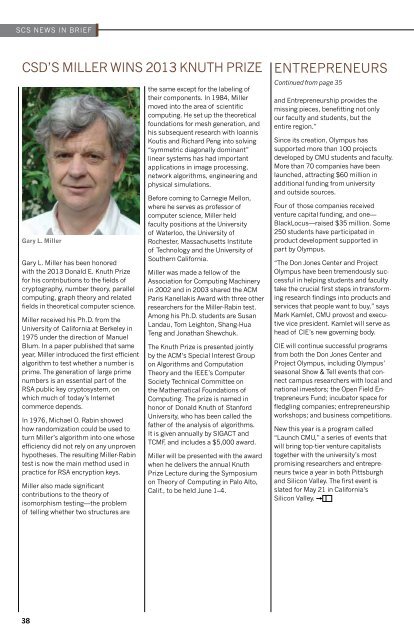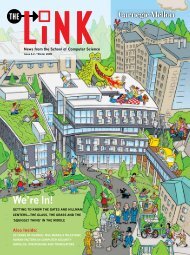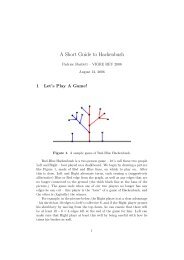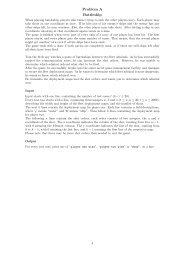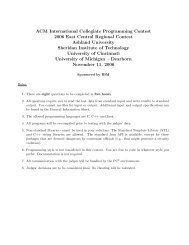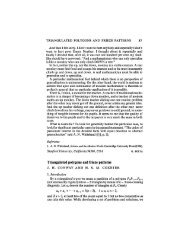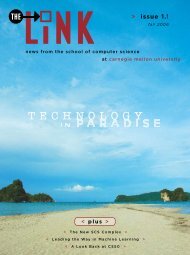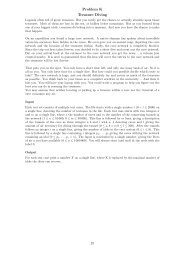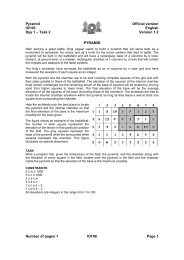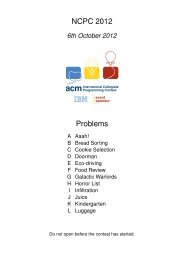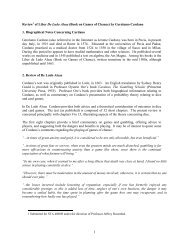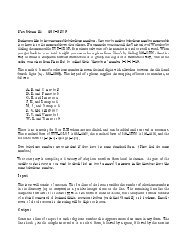Download now (1.3MB, PDF reader required) - Link home page
Download now (1.3MB, PDF reader required) - Link home page
Download now (1.3MB, PDF reader required) - Link home page
Create successful ePaper yourself
Turn your PDF publications into a flip-book with our unique Google optimized e-Paper software.
SCS NEWS IN BRIEF<br />
CSD’S MILLER WINS 2013 KNUTH PRIZE<br />
gary l. miller<br />
Gary L. Miller has been honored<br />
with the 2013 Donald E. Knuth Prize<br />
for his contributions to the fields of<br />
cryptography, number theory, parallel<br />
computing, graph theory and related<br />
fields in theoretical computer science.<br />
Miller received his Ph.D. from the<br />
University of California at Berkeley in<br />
1975 under the direction of Manuel<br />
Blum. In a paper published that same<br />
year, Miller introduced the first efficient<br />
algorithm to test whether a number is<br />
prime. The generation of large prime<br />
numbers is an essential part of the<br />
RSA public key cryptosystem, on<br />
which much of today’s Internet<br />
commerce depends.<br />
In 1976, Michael O. Rabin showed<br />
how randomization could be used to<br />
turn Miller’s algorithm into one whose<br />
efficiency did not rely on any unproven<br />
hypotheses. The resulting Miller-Rabin<br />
test is <strong>now</strong> the main method used in<br />
practice for RSA encryption keys.<br />
Miller also made significant<br />
contributions to the theory of<br />
isomorphism testing—the problem<br />
of telling whether two structures are<br />
the same except for the labeling of<br />
their components. In 1984, Miller<br />
moved into the area of scientific<br />
computing. He set up the theoretical<br />
foundations for mesh generation, and<br />
his subsequent research with Ioannis<br />
Koutis and Richard Peng into solving<br />
“symmetric diagonally dominant”<br />
linear systems has had important<br />
applications in image processing,<br />
network algorithms, engineering and<br />
physical simulations.<br />
Before coming to Carnegie Mellon,<br />
where he serves as professor of<br />
computer science, Miller held<br />
faculty positions at the University<br />
of Waterloo, the University of<br />
Rochester, Massachusetts Institute<br />
of Technology and the University of<br />
Southern California.<br />
Miller was made a fellow of the<br />
Association for Computing Machinery<br />
in 2002 and in 2003 shared the ACM<br />
Paris Kanellakis Award with three other<br />
researchers for the Miller-Rabin test.<br />
Among his Ph.D. students are Susan<br />
Landau, Tom Leighton, Shang-Hua<br />
Teng and Jonathan Shewchuk.<br />
The Knuth Prize is presented jointly<br />
by the ACM’s Special Interest Group<br />
on Algorithms and Computation<br />
Theory and the IEEE’s Computer<br />
Society Technical Committee on<br />
the Mathematical Foundations of<br />
Computing. The prize is named in<br />
honor of Donald Knuth of Stanford<br />
University, who has been called the<br />
father of the analysis of algorithms.<br />
It is given annually by SIGACT and<br />
TCMF, and includes a $5,000 award.<br />
Miller will be presented with the award<br />
when he delivers the annual Knuth<br />
Prize Lecture during the Symposium<br />
on Theory of Computing in Palo Alto,<br />
Calif., to be held June 1–4.<br />
ENTREPRENEURS<br />
Continued from <strong>page</strong> 35<br />
and Entrepreneurship provides the<br />
missing pieces, benefitting not only<br />
our faculty and students, but the<br />
entire region.”<br />
Since its creation, Olympus has<br />
supported more than 100 projects<br />
developed by CMU students and faculty.<br />
More than 70 companies have been<br />
launched, attracting $60 million in<br />
additional funding from university<br />
and outside sources.<br />
Four of those companies received<br />
venture capital funding, and one—<br />
BlackLocus—raised $35 million. Some<br />
250 students have participated in<br />
product development supported in<br />
part by Olympus.<br />
“The Don Jones Center and Project<br />
Olympus have been tremendously successful<br />
in helping students and faculty<br />
take the crucial first steps in transforming<br />
research findings into products and<br />
services that people want to buy,” says<br />
Mark Kamlet, CMU provost and executive<br />
vice president. Kamlet will serve as<br />
head of CIE’s new governing body.<br />
CIE will continue successful programs<br />
from both the Don Jones Center and<br />
Project Olympus, including Olympus’<br />
seasonal Show & Tell events that connect<br />
campus researchers with local and<br />
national investors; the Open Field Entrepreneurs<br />
Fund; incubator space for<br />
fledgling companies; entrepreneurship<br />
workshops; and business competitions.<br />
New this year is a program called<br />
“Launch CMU,” a series of events that<br />
will bring top-tier venture capitalists<br />
together with the university’s most<br />
promising researchers and entrepreneurs<br />
twice a year in both Pittsburgh<br />
and Silicon Valley. The first event is<br />
slated for May 21 in California’s<br />
Silicon Valley.<br />
38


